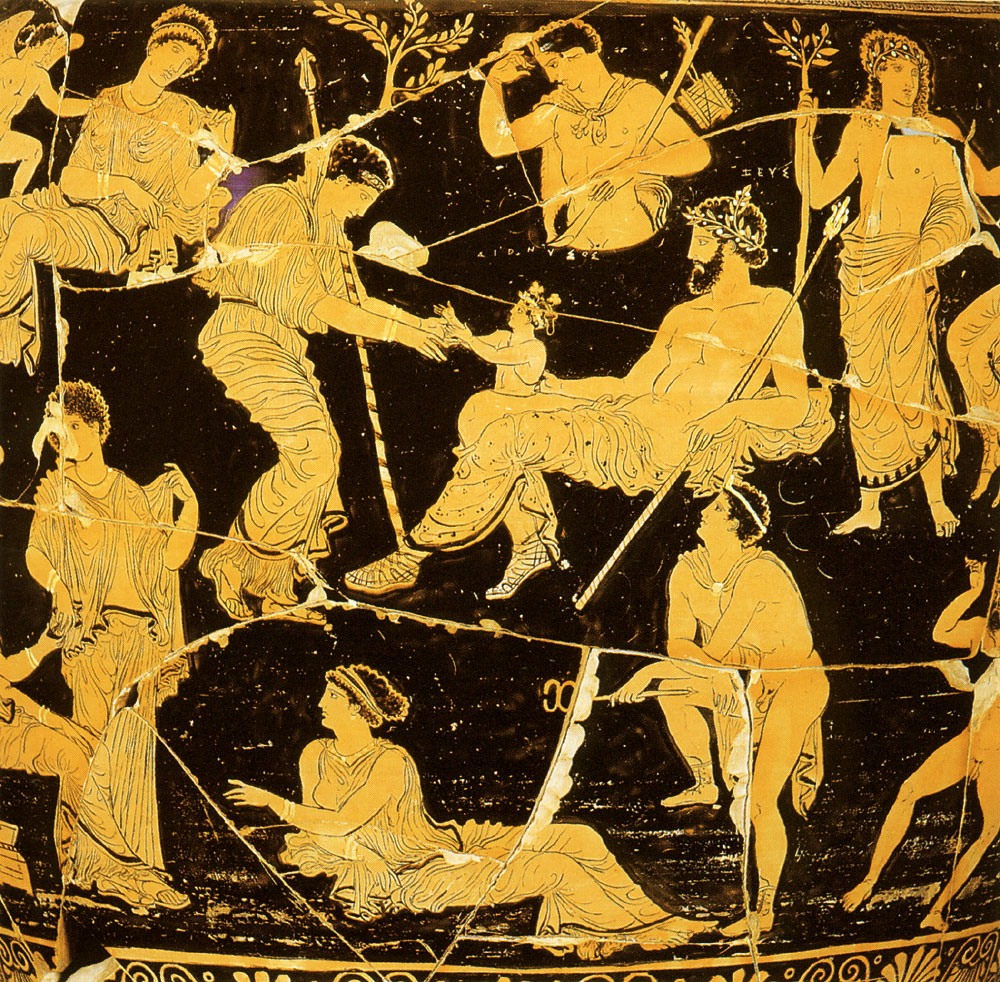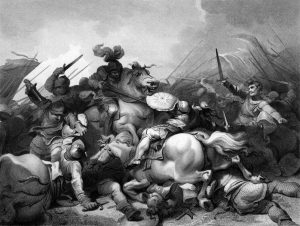Parties with drinking, dancing, and singing are rarely thought of as cults. Cults are often thought of as small religious groups that are frowned upon and viewed with suspicion by outsiders. Today, when we hear the word cult, we imagine people wearing white robes, creepy leaders and brainwashed followers who follow their leaders into rituals of mass suicide by Kool-Aid. In ancient Greece, however, everyone wanted to be a part of the Cult of Dionysus, where everyone would gather with free food, free wine, and the Goat Song.
Dionysus is the Greek God of wine, of winemaking, and of merriment and gaiety. He was supposed to have been born by the union of a mortal woman, Semele, princess of Thebes, and the greatest of the Greek gods, Zeus. Ancient Greek mythology holds that he was twice born, because when Semele was pregnant with Dionysus, Zeus took him and kept him in his thigh until he was ready to be born. While this may sound strange, there is a good explanation. Hera, Zeus’ wife who was also a goddess, had learned that Zeus had impregnated a moral woman; she was filled with jealousy and rage. The vengeful Hera disguised herself as a mortal woman and visited Semele. Once with her, she convinced Semele to ask Zeus to grant her one wish. When Semele asked for her one wish, Zeus promised to grant her anything. Semele asked Zeus to present himself in his true form, as a god not as a man, as suggested by Hera. Zeus kept his promise, but he knew that if Semele ever gazed upon him, she would die. So when he revealed himself to Semele in his true form, Zeus had Hermes take Dionysus from her womb and placed him into Zeus’ thigh so that he would not also die with Semele.1

As the god of wine, Dionysus is supposed to spread the knowledge of how to grow grape vines. In ancient Greece, wine was one of the few goods they could produce. Because of this, Dionysus was a major deity, and it was said that he was one of the twelve gods that lived upon Mount Olympus. Temples were erected in his honor and worship of him spread throughout the Greek poleis. Annual festivals called Dionysia were held in his honor and, of course, the purpose was to relax, feast, dance, and drink wine.2

Some dances in honor of Dionysus were performed on oiled wineskins, which were bags made out of animal skins that were filled with wine. Dionysus loved goats, donkeys, and tigers. Not only were those animals at the Dionysia, but their skins were also danced upon. When someone fell off the oiled wineskins, everyone cheered, laughed, and drank wine.
The Greeks held competitions to see who might be the manliest man and who could drink a pitcher of wine the fastest. The winner would receive a smaller oiled wineskin as a trophy, which was essentially another container of wine.3

At the annual Dionysia, the Goat Song was also preformed. The Goat Song gave birth to Greek drama. Originally, a song or hymn was sung as a goat was being sacrificed to Dionysus. The song often addressed questions that were arising about divine law, judgement, and various social conflicts of general concern. The Goat Song was seen as something of a group discussion or address of common concerns, and as a way for people collectively and individually to purify their minds. The hymn then became a performance piece, sung by a chorus. The performance evolved over time to include first a monologue, and then with the addition of a second voice, a dialogue. Eventually, more voices were added, and the performance of the Goat Song became the tragic drama we have come to associate with the great Greek tragedians Aeschylus, Sophocles, and Euripides. In fact, the Greek word tragedia, from which we get our word tragedy, literally translates as “the song of a male goat.” The Greeks truly loved drama because they felt that the gods were speaking to them and judging their piety, rather than merely being annoyed by them.4
The cult of Dionysus does not seem so suspicious now. There were not any outrageous daily rituals or strange articles of clothing they had to wear. The cult of Dionysus consisted of dancing, drinking, singing, and feasting, every college student’s four favorite things.
- Salem Press Encyclopedia, January 2016, s.v. “Dionysus,” by Rebecca K. Rector. ↵
- Eleni Pachoumi, “Dionysus in the Greek Magical Papyri,” Symboae Osloenses 88, no. 1, (2014): 129. ↵
- Alana Koontz, “The Art and Artifacts Associated with the Cult of Dionysus,” (Masters Thesis, University of Wisconsin-Milwaukee, 2013), 4. ↵
- Britt-Mari Näsström, “The rites in the mysteries of Dionysus: the birth of the drama,” Åbo Akademi: Open Journal Systems. (2014): BASE, EBSCOhost. ↵



77 comments
Kailan Pena
It was interesting to learn about a cult dedicated to drunk parties. I knew of Dionysus and his importance in Greek mythology but I had no idea that there was groups of people that worshiped him by getting drunk and dancing around. I also really liked how there was a song named after a goat, and how much Dionysus was into livestock and such.
Destiny Flores
Before reading this, I had never heard of Dionysus. It’s quite interesting how it challenges our traditional interpretation of a “cult” and forces us to sort of look at the idea of these groups differently. The article was very informative, in the fact that it explains the origin of the story and lineage of greek mythology, and also is engaging with the funny ending.
Didier Cadena
Dionysus is one of my favorite Greek characters because of his origin. I think it is amusing to have first heard that he was born from Zeus’ thigh, because it is something that you do not often hear of. The article does a great job of giving the read the backstory of Dionysus and his cult. The way that the article is well written and enjoyable to read.
Bryan Martin Patino
Dionysius is one of my favorite greek gods but i had not known the origin of his birth or that Zeus had carried him in his thigh. although that is weird and he is seen now adays, as a god for drunks sense he is the god of wine. this article shows that he was a very exceptional part of greece and there development of wine and vines. it was an excellent article.
Natalie Childs
I really enjoyed this article. It did a great job of challenging our concept of what a cult is and of showing how ideas and words can evolve with time. I am a big fan of mythology and had read some previously on Dionysus, but had never read about his cult. Something that I also really found interesting is the song of the goat and the evolution of it being a simple song to a drawn out and dramatic play of sorts.
Belene Cuellar
Today in society we hear the word cult and suddenly everyone becomes silent and afraid of the what kind of actions a cult can do. In this article we see a cult that worships the god of wine by singing, dancing, and drinking wine. I’ve read a number of Greek mythology and I have never read about Dionysius, the God of wine. His story is intriguing and totally captured my interest.
Samuel Stallcup
I was unaware of who Dionysus was until a couple of days ago, and in the context of our class, he was used as an example of a never-ending appetite, “God of Lust/Want” of some sort. This article helped me better understand Dionysus’s character for, with the examples you provided, it spoke about what his persona means and does.
Osman Rodriguez
Greek mythology has always interested me at the fact that I liked to here the origins of it and ts people. Although I don’t actively seek to better my knowledge on Greek mythology, I am not one to pass the opportunity when it presents itself. The cult of Dionysus definitely seems like the cult to be in. I enjoy any leisure time I am allowed and relaxing to music and food seems like one of the best ways to do so. I had never heard of Dionysus before, but I’m sure I have seen sculptures of him.
Auroara-Juhl Nikkels
I thought your article was informative as well as amusing. I knew some of Dionysius’ history, how he was born and his like for parties, but i didn’t know of the “Cult of Dionysius.” I think it is interesting how almost obsessed with goats and donkeys he is. He created an entire game, dance, and song that has to do with goats.
Aaiyanna Johnson
I love Greek mythology, and Dionysus is one of my favorites because he mostly associated with all things fun. I did not know however, that there was a cult, and a huge celebration surrounded around him. It is interesting how meanings of words can change overtime; it was an innocuous gathering, and now it’s frowned upon. I liked the article and it’s historical background